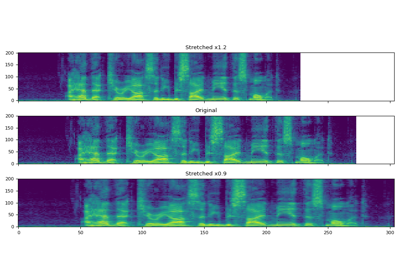TimeStretch¶
- class torchaudio.transforms.TimeStretch(hop_length: Optional[int] = None, n_freq: int = 201, fixed_rate: Optional[float] = None)[source]¶
Stretch stft in time without modifying pitch for a given rate.
Proposed in SpecAugment [Park et al., 2019].
- Parameters:
hop_length (int or None, optional) – Length of hop between STFT windows. (Default:
n_fft // 2, wheren_fft == (n_freq - 1) * 2)n_freq (int, optional) – number of filter banks from stft. (Default:
201)fixed_rate (float or None, optional) – rate to speed up or slow down by. If None is provided, rate must be passed to the forward method. (Default:
None)
Note
The expected input is raw, complex-valued spectrogram.
- Example
>>> spectrogram = torchaudio.transforms.Spectrogram(power=None) >>> stretch = torchaudio.transforms.TimeStretch() >>> >>> original = spectrogram(waveform) >>> stretched_1_2 = stretch(original, 1.2) >>> stretched_0_9 = stretch(original, 0.9)

- Tutorials using
TimeStretch:
- forward(complex_specgrams: Tensor, overriding_rate: Optional[float] = None) Tensor[source]¶
- Parameters:
complex_specgrams (Tensor) – A tensor of dimension (…, freq, num_frame) with complex dtype.
overriding_rate (float or None, optional) – speed up to apply to this batch. If no rate is passed, use
self.fixed_rate. (Default:None)
- Returns:
Stretched spectrogram. The resulting tensor is of the corresponding complex dtype as the input spectrogram, and the number of frames is changed to
ceil(num_frame / rate).- Return type:
Tensor

